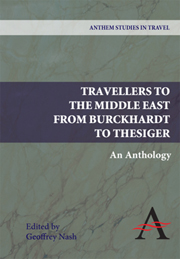Book contents
- Frontmatter
- Contents
- Acknowledgements
- Introduction
- PART ONE THE COMING OF EMPIRE 1800–1879
- The Ottoman Empire and Egypt
- Arabia
- 1 Travels in Arabia
- 2 Travels in Arabia
- 3 Personal Narrative of a Pilgrimage to Al-Madinah and Meccah
- 4 Narrative of a Year's Journey Through Central and Eastern Arabia
- 5 A Pilgrimage to Nejd
- 6 Travels in Arabia Deserta
- Persia
- PART TWO COLONIALISM AND RESISTANCE 1880–1950
- Bibliography
1 - Travels in Arabia
from Arabia
Published online by Cambridge University Press: 05 March 2012
- Frontmatter
- Contents
- Acknowledgements
- Introduction
- PART ONE THE COMING OF EMPIRE 1800–1879
- The Ottoman Empire and Egypt
- Arabia
- 1 Travels in Arabia
- 2 Travels in Arabia
- 3 Personal Narrative of a Pilgrimage to Al-Madinah and Meccah
- 4 Narrative of a Year's Journey Through Central and Eastern Arabia
- 5 A Pilgrimage to Nejd
- 6 Travels in Arabia Deserta
- Persia
- PART TWO COLONIALISM AND RESISTANCE 1880–1950
- Bibliography
Summary
Born Jean Louis Burckhardt into a wealthy Swiss manufacturing and trading family, Burckhardt was forced to leave Switzerland as a result of his father's falling out with the new order thrown up by the French Revolution. After studying at Leipzig and Göttingen universities he moved to England (1806) where he gained employment with the Association for Promoting the Discovery of the Interior Parts of Africa (1808). He studied Arabic at Cambridge University before travelling to Syria staying in Aleppo for two years (1809–11) where he acquired a scholarly knowledge of Arabic and the Qur'an. He also travelled in Lebanon and Palestine before reaching Cairo in September 1812. Burckhardt's identity therefore twice shifted: the new ruler of Egypt, Muhammad Ali, believed the Swiss to be an English spy, even though he had adopted the persona of Sheykh Ibrahim, a poor Muslim scholar of Aleppo. Journeys in Upper Egypt and Nubia followed, before Burckhardt determined to put his Arab identity to the ultimate test by going to Mecca and Medina where he eventually stayed for two years (1814–15). Travelling in reduced circumstances and plagued by ill health, a combination of his remarkable knowledge of written and spoken Arabic and the ambiguous protection of Muhammad Ali ensured that he succeeded in taking sufficient notes to be able later to write his seminal Travels in Arabia (1829) This and two other works, Travels in Nubia (1819) and Notes on the Bedouins and Wahabys (1822), were published posthumously under the auspices of the Africa Association, Burckhardt having died of dysentery in Cairo in 1817.
- Type
- Chapter
- Information
- Travellers to the Middle EastAn Anthology, pp. 46 - 51Publisher: Anthem PressPrint publication year: 2009



